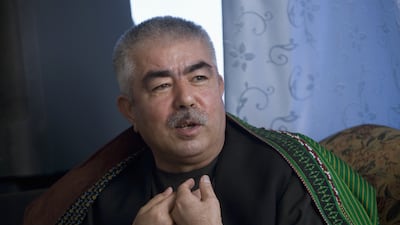KABUL // Afghanistan’s embattled vice president Abdul Rashid Dostum has left for Turkey, officials said on Saturday, in what could be another long exile for the former warlord who is mired in allegations that he ordered the rape and torture of a political rival.
Mr Dostum, a powerful Uzbek warlord linked to a catalogue of war crimes, departed on Friday in the middle of a criminal investigation that has drawn attention to the culture of impunity that is impeding western-backed efforts to instil the rule of law in Afghanistan.
There was no official word from the government about Mr Dostum’s future, and officials declined to say whether his departure was linked to any investigation by the Afghan authorities into the incident, but speculation is rife that he has sought temporary exile in Turkey in a bid to escape prosecution, with observers saying it could mark the end of his chequered political career in Afghanistan.
He has not been charged with any offence, and the status of the government’s investigation is unclear. However, his spokesman Bashir Ahmad Tahyanj, said he had gone to Turkey for medical check-ups and to visit his family.
Mr Dostum, 63, is accused of abducting rival Ahmad Ishchi last year during a game of Buzkashi – a type of polo played with an animal carcass – in northern Jowzjan province. Mr Ischi was allegedly held hostage in Mr Dostum’s private compound for five days, where he was tortured and sexually assaulted – allegations which Mr Dostum denies.
Nobody was arrested or charged despite reports that medical evidence backed Mr Ishchi’s claims that he was abused. Afghanistan’s western allies initially piled pressure on president Ashraf Ghani’s government to prosecute Mr Dostum, who has survived all earlier allegations of abuse, but Mr Dostum evaded questioning by retreating to his palace in central Kabul, guarded by his armed militiamen.
In the public standoff it was clear the government favoured exile rather than a criminal trial against Mr Dostum, which could trigger violence from his Uzbek support base.
It would not be the first period of exile in Turkey for Mr Dostum, a man the US state department once called the “quintessential warlord”. In 2008, he left for Turkey amid similar accusations that his men had abducted, beaten and sexually abused a political rival in Kabul, then fired on police responding to the incident.
But former president Hamid Karzai called him back and Mr Dostum re-entered Afghan politics, eventually becoming vice president to Mr Ghani in the 2014 elections. This new development highlights what human rights defenders say is a sobering reality of Afghan politics: some strongmen are simply too powerful to prosecute.
“It’s a stunning example of what has become standard practice in Afghanistan, not just for Dostum but for anyone in a position of power: having promised to deliver justice the government has shown itself ultimately unwilling to do so,” said Patricia Gossman, Afghanistan researcher with Human Rights Watch.
Earlier this month, another former warlord Gulbuddin Hekmatyar, who shelled Kabul during the civil war in the 1990s, returned to Kabul as part of a peace deal granting him immunity.
Mr Tayanj insisted the vice-president would be back in Afghanistan soon. “General Dostum never leaves the country but remains alongside his people during difficult times,” he said.
* Agence France Presse and Reuters

